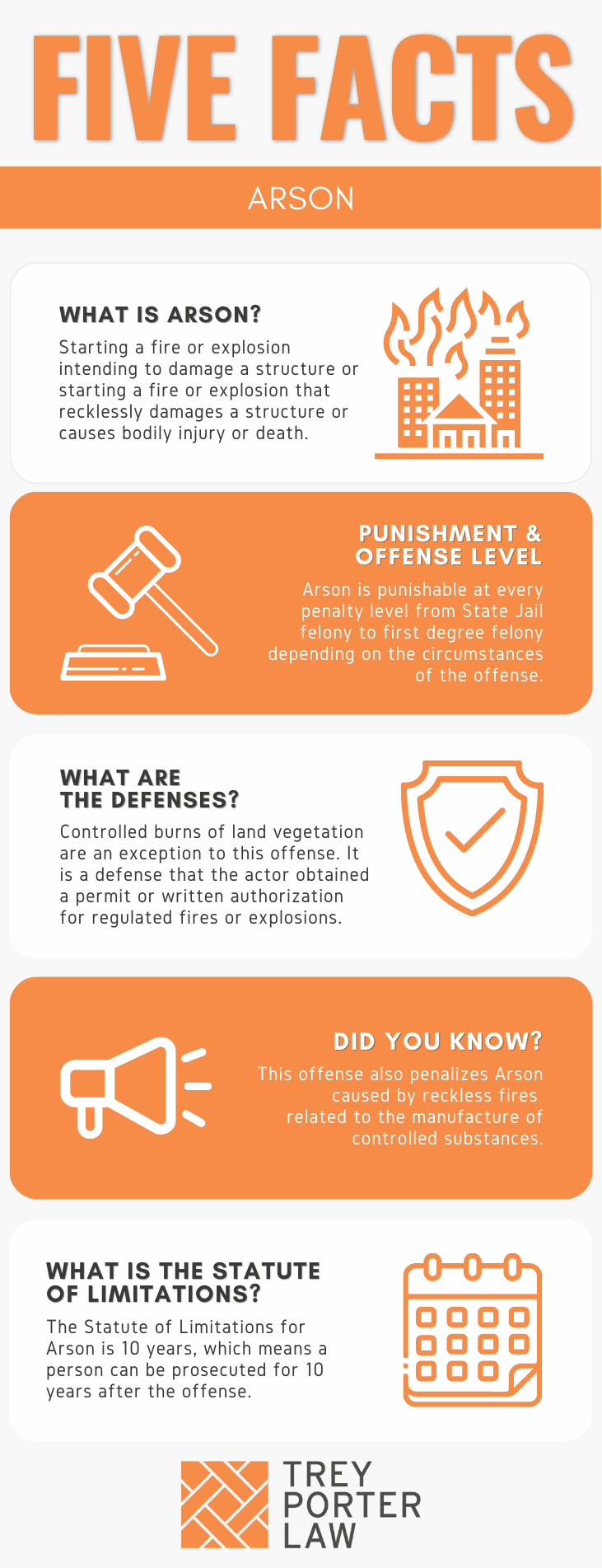WHAT IS ARSON IN TEXAS?
The Texas law against arson prohibits a person from starting a fire or causing an explosion with the intent to damage or destroy certain property, or recklessly damaging certain property by starting a fire or causing an explosion.
WHAT IS THE ARSON LAW IN TEXAS?
Tex. Penal Code § 28.02. ARSON.
(a) A person commits an offense if the person starts a fire, regardless of whether the fire continues after ignition, or causes an explosion with intent to destroy or damage:
(1) any vegetation, fence, or structure on open-space land; or
(2) any building, habitation, or vehicle:
(A) knowing that it is within the limits of an incorporated city or town;
(B) knowing that it is insured against damage or destruction;
(C) knowing that it is subject to a mortgage or other security interest;
(D) knowing that it is located on property belonging to another;
(E) knowing that it has located within it property belonging to another; or
(F) when the person is reckless about whether the burning or explosion will endanger the life of some individual or the safety of the property of another.
(a-1) A person commits an offense if the person recklessly starts a fire or causes an explosion while manufacturing or attempting to manufacture a controlled substance and the fire or explosion damages any building, habitation, or vehicle.
(a-2) A person commits an offense if the person intentionally starts a fire or causes an explosion and in so doing:
(1) recklessly damages or destroys a building belonging to another; or
(2) recklessly causes another person to suffer bodily injury or death.
(b) It is an exception to the application of Subsection (a)(1) that the fire or explosion was a part of the controlled burning of open-space land.
(c) It is a defense to prosecution under Subsection (a)(2)(A) that prior to starting the fire or causing the explosion, the actor obtained a permit or other written authorization granted in accordance with a city ordinance, if any, regulating fires and explosions.
(d) An offense under Subsection (a) is a felony of the second degree, except that the offense is a felony of the first degree if it is shown on the trial of the offense that:
(1) bodily injury or death was suffered by any person by reason of the commission of the offense; or
(2) the property intended to be damaged or destroyed by the actor was a habitation or a place of assembly or worship.
(e) An offense under Subsection (a-1) is a state jail felony, except that the offense is a felony of the third degree if it is shown on the trial of the offense that bodily injury or death was suffered by any person by reason of the commission of the offense.
(f) An offense under Subsection (a-2) is a state jail felony.
(g) If conduct that constitutes an offense under Subsection (a-1) or that constitutes an offense under Subsection (a-2) also constitutes an offense under another subsection of this section or another section of this code, the actor may be prosecuted under Subsection (a-1) or Subsection (a-2), under the other subsection of this section, or under the other section of this code.
WHAT IS THE PENALTY CLASS FOR ARSON IN TEXAS?
The penalty category for arson depends on the targeted property, and whether anyone was injured or killed as a result. Arson is a:
- State jail felony, punishable by 180 days to two years in a state jail facility, if a person recklessly starts a fire or causes an explosion while manufacturing a controlled substance;
- Third degree felony, punishable by two to ten years in prison, if a person recklessly starts a fire or causes an explosion:
- while manufacturing a controlled substance; and
- anyone suffers bodily injury or death as a result.
- Second degree felony, punishable by two to 20 years in prison, if a person intentionally starts a fire or causes an explosion with the intent to damage or destroy property.
- First degree felony, punishable by five to 99 years or life in prison, if a person starts a fire or explosion, and:
- another person is injured or dies as a result; or
- the target property of the arson is a home, place of assembly, or place of worship.
Texas Penal Code Section 12.501 increases the penalty to the next highest offense category if the arson is committed against a public servant, a member of the public servant’s family or household, or property owned or controlled by a public servant, in retaliation for or on account of the public servant’s status.
WHAT IS THE PUNISHMENT RANGE FOR ARSON IN TEXAS?
Committing arson by intentionally starting a fire or causing an explosion with the intent to damage or destroy property is generally a second degree felony, punishable by two to 20 years in prison, and a maximum fine of $10,000.
Intentional arson becomes a first degree felony when the property intended to be destroyed is another’s home, or place of assembly or worship, or another person is injured or dies in the fire or explosion. A first degree felony in Texas is punishable by five to 99 years or life in prison, and a maximum $10,000 fine.
Reckless arson is a state jail felony if the fire or explosion occurs while manufacturing a controlled substance, punishable by 180 days to two years in a state jail facility, and up to a $10,000 fine. If anyone is injured or dies as a result of the fire or explosion, reckless arson becomes a third degree felony, which carries two to ten years in prison, and a maximum fine of $10,000.
WHAT ARE THE PENALTIES FOR ARSON IN TEXAS?
A person charged with arson may be eligible for probation after a conviction, or deferred adjudication without a conviction. If the arson is a first degree felony, a judge may order:
- probation (post-conviction community supervision) for a period between five and ten years, or
- up to ten years of deferred adjudication community supervision, and
- up to 180 days in jail as a condition of community supervision.
For arson charged as a second degree felony, a person may be placed on probation for a period between two and ten years, or deferred adjudication for up to ten years. A judge may also order up to 180 days in jail as a condition of community supervision.
The length of community supervision for a state jail felony is from two to five years, with the possibility of extending supervision for up to ten years. If a person is charged with third degree felony arson, the probation period may range from two to five years, and a deferred adjudication term may not exceed ten years.
WHAT ARE THE DEFENSES TO ARSON IN TEXAS?
It is a defense to arson if, before starting a fire or causing an explosion within city limits, a person obtains a permit or other written authorization granted in accordance with a city ordinance, if any, regulating fires or explosions. While this is a defense to criminal charges and penalties, it will not absolve a person of financial responsibility for property damage as a result of the fire or explosion.
Texas law also provides an exception to arson if a person starts a fire as part of a controlled burn of open-space land. This exception recognizes the agricultural necessity of controlled burning of overgrown vegetation.
WHAT IS THE STATUTE OF LIMITATIONS FOR ARSON IN TEXAS?
The limitation period for arson is ten years.
ARSON IN TEXAS
Texas law prohibits starting a fire or causing an explosion with intent to destroy or damage property. If the fire was intentionally set to damage property, the person starting the fire or causing the explosion is criminally responsible for any resulting harm to people affected by the fire or explosion.
TEXAS ARSON COURT CASES
The case law regarding arson in Texas shows appellate courts’ willingness to accept circumstantial evidence connecting a person to an arson charge, such as testimony by fire investigators who determine the origins of fires, and whether they were intentionally set.
- In Barr v. State, a defendant was convicted of setting fire to the victims’ trailer home. A witness saw the defendant leaving the scene, but could not identify him because his face was covered. Arson investigators testified in detail about the fire pattern, and concluded it was started with a liquid accelerant at two exterior points of the trailer. Video surveillance showed the defendant’s friend purchasing gasoline shortly before driving the defendant to the victims’ trailer.
The appellate court held that although no one could specifically identify the defendant as the person who started the fire, the totality of evidence supported the jury’s guilty verdict.
- In Merritt v. State, a defendant was convicted of arson after setting his SUV on fire and filing an insurance claim. The evidence showed that the defendant was behind on his payments, and reported the SUV stolen a day before it was found abandoned and burned. He never called OnStar, which would have located the vehicle immediately. The fire marshall found burned paper at three separate areas inside the SUV, indicating three points of origin. He also found unused matches on the ground next to the SUV. Items from the car were found in the defendant’s garage, along with matches. The appellate court affirmed the conviction.













